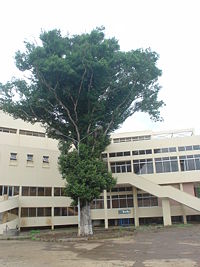| Revision as of 18:07, 12 May 2009 editThiagodoherty (talk | contribs)26 editsNo edit summary← Previous edit | Revision as of 19:34, 18 August 2009 edit undo96.56.146.202 (talk) →External linksNext edit → | ||
| Line 46: | Line 46: | ||
| * Weight loss | * Weight loss | ||
| * Integra-Lean Irvingia: Patented Extract | * Integra-Lean Irvingia: Patented Extract | ||
| * IrvingiaRX: | |||
| ] | ] | ||
Revision as of 19:34, 18 August 2009
| Irvingia | |
|---|---|
| File:OGBONO.JPG | |
| Ogbono nuts | |
| Scientific classification | |
| Kingdom: | Plantae |
| Division: | Magnoliophyta |
| Class: | Magnoliopsida |
| Order: | Malpighiales |
| Family: | Irvingiaceae |
| Genus: | Irvingia |
| Species | |
|
see text | |

Irvingia is a genus of African and Southeast Asian trees in the family Irvingiaceae, sometimes known by the common names wild mango, African mango, or bush mango. They bear edible mango-like fruits, and are especially valued for their fat- and protein-rich nuts, known as ogbono, etima, odika, or dika nuts.
The subtly aromatic nuts are typically dried in the sun for preservation, and are sold whole or in powder form. They may be ground to a paste known variously as dika bread or Gabon chocolate. Their high content of mucilage enables them to be used as thickening agents for dishes such as ogbono soup. The nuts may also be pressed for vegetable oil.
The fruit is a large drupe, with fibrous flesh.
The trees yield a hard wood, useful in construction.
A traditional food plant in Africa, this little-known fruit has potential to improve nutrition, boost food security, foster rural development and support sustainable landcare. Irvingia has been shown to significantly reduce body fat in obese subjects versus placebo.
In October, 2008, during the fifth annual Functional Foods for Chronic Disease conference in Baton Rouge, Louisiana, Dr. Julius Oben, Head of the Laboratory of Nutrition and Nutritional Biochemistry at the University of Yaoundé, Cameroon, revealed the latest clinical evidence on a recently developed extract from the seed of the Irvingia gabonensis fruit, also known as bush mango and ogbono.
Dr. Oben was performing epidemiological studies in African tribal populations when he noted that people in a certain region had low incidences of obesity, diabetes, and related diseases. Exploring further, he found that they use irvingia paste to thicken soups an average of ten times per week. This led to the development of a concentrated extract that stimulates fat loss while promoting healthy cholesterol and blood sugar levels.
Leptin is a hormone that inhibits food intake in people of normal body weight by reducing the hunger signals from the brain. However, obese individuals often produce so much leptin that their cells become resistant to it. A patented irvingia extract was shown to improve leptin sensitivity, so the test subjects felt less hunger and ate less. The extract was also shown to increase the levels of adiponectin, a hormone secreted by fat cells that promotes insulin sensitivity. When more blood sugar makes its way inside the working cells, less is delivered to the fat cells for storage. Adiponectin has anti-inflammatory and cardiovascular benefits as well.
Species
- Irvingia gabonensis (Aubry-Lecomte ex O'Rorke) Baill.
- Irvingia malayana Oliv. ex A. W. Benn.
References
- National Research Council (2006-10-27). "Dika". Lost Crops of Africa: Volume II: Vegetables. Lost Crops of Africa. Vol. 2. National Academies Press. ISBN 978-0-309-10333-6. Retrieved 2008-07-15.
{{cite book}}: Cite has empty unknown parameter:|origdate=(help); External link in|chapterurl=|chapterurl=ignored (|chapter-url=suggested) (help) - Judith L Ngondi,1 Julius E Oben, and Samuel R Minka1 (2005). "The effect of Irvingia gabonensis seeds on body weight and blood lipids of obese subjects in Cameroon". Lipids Health Dis. 12 (4). PMID 15916709.
{{cite journal}}: CS1 maint: multiple names: authors list (link) CS1 maint: numeric names: authors list (link) - "Powerful Weight-Loss Extract Introduced at Functional Foods Conference". Life Extension Foundation. Retrieved 2009-05-11.
- "Understanding the Risks of Leptin Resistance". Life Extension Foundation. Retrieved 2009-05-11.
- "Scientific Abstracts: February 2009 Abstracts: Irvingia". Life Extension Foundation. Retrieved 2009-05-11.
External links
- " Multilingual taxonomic information". University of Melbourne.
- Wood technical fact sheet from the US Forest Service's Forest Products Laboratory , an agency of the USDA.
- Ogbono Soup from "The Congo Cookbook (African Recipes)".
- Weight loss "Study"
- Integra-Lean Irvingia: Patented Irvingia Extract
- IrvingiaRX: "Irvingia Gabonensis"
This Malpighiales article is a stub. You can help Misplaced Pages by expanding it. |
This food ingredient article is a stub. You can help Misplaced Pages by expanding it. |